Crops for Charity
By Yeh Tzu-hao (葉子豪)
Photos provided by Tzu Chi Mozambique
Translated by Wu Hsiao-ting (吳曉婷)
Crops for Charity
By Yeh Tzu-hao (葉子豪)
Photos provided by Tzu Chi Mozambique
Translated by Wu Hsiao-ting (吳曉婷)
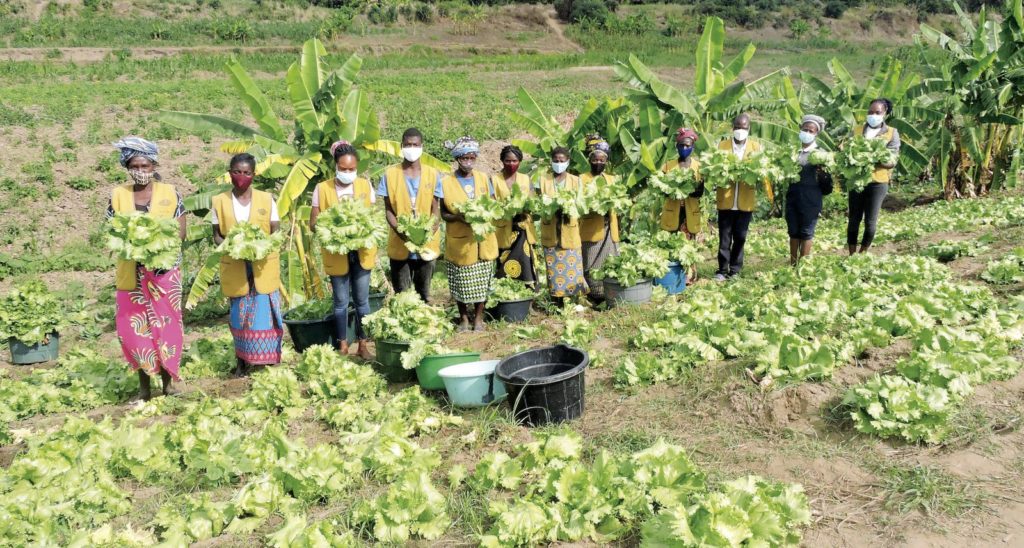
The three Great Love Farms in Metuchira, Sofala Province, Mozambique, yield different vegetables every month. Volunteers sowed lettuce seeds in May and harvested the crop two months later. The harvested vegetables were distributed to the needy.
It was July 2021. Twenty mask-wearing villagers were hard at work on a large plot of farmland in Metuchira, Sofala Province, Mozambique, located on the southeastern coast of Africa. April to September is the dry season in Mozambique, and rain had not graced Metuchira for some time. Even so, the vegetables on the farm had grown well. Different volunteers worked on the farm every day; today's group were happily harvesting Chinese broccoli and cabbages. Seeing how the vegetables had flourished, the 20 volunteer villagers sang with joy.
Carrying the harvested produce on their heads, the volunteers headed back to their village, still singing. Once there, they started sorting the vegetables into one container after another to distribute to the needy. They were happy knowing the results of their hard work would help ease the recipients' food insecurity for the next few days.
Giving Back
In many people's minds, Africa is the Dark Continent, long plagued by famine and political turmoil. Caucasian or Asian people wearing clothing bearing the names of United Nations agencies or non-government organizations (NGO) distributing food and other aid to long lines of African people is a familiar picture to many. In such scenarios, the contrasting roles of givers and receivers are as clear-cut and distinct as can be.
Some villagers in Mozambique's Sofala Province, however, have switched from being merely aid recipients to aid providers. After receiving food aid in distributions, they turn around and donate some of their share to help other underserved people. Some donate their spare change too, or even volunteer on farms to tend to vegetables grown for distribution to needy households.
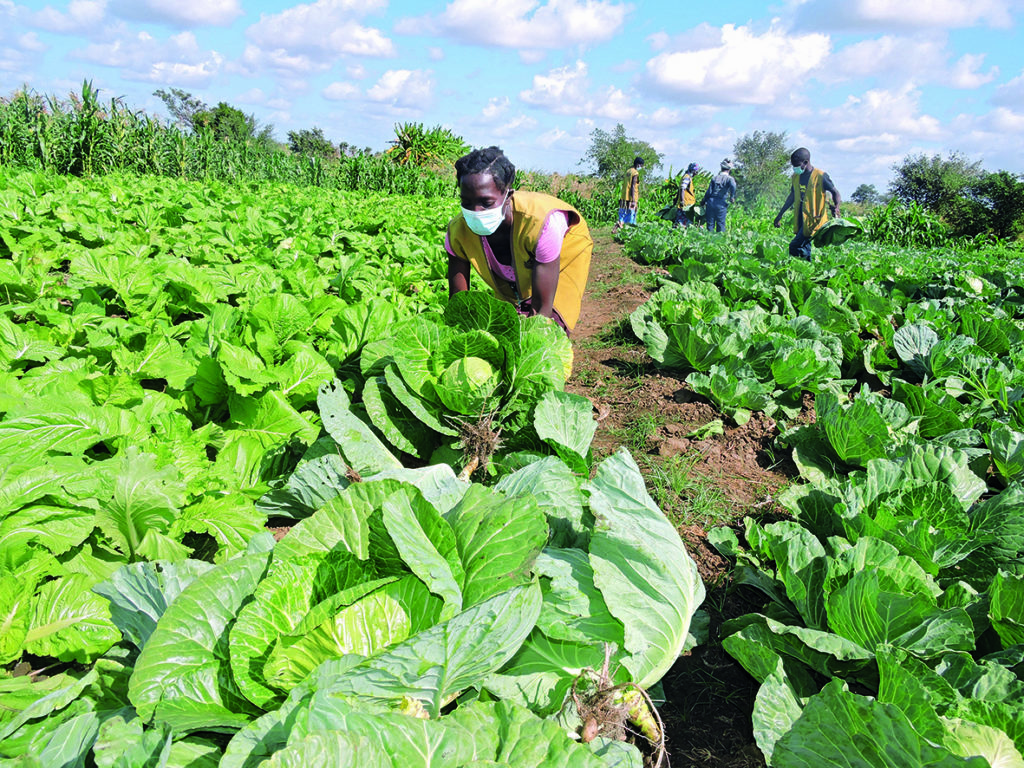
A volunteer harvests cabbages on a Great Love Farm. No chemical pesticides or fertilizers are used. Volunteers work in shifts tending to and watering the crops.
Those that understand the challenges facing Mozambique might ask, "Why are they helping others? Aren't they in need of help themselves?" After all, the country has suffered its fair share of misfortune. It was pummeled by Cyclone Idai in March 2019. The central part of the nation, where Sofala Province is located, was among the hardest hit areas. Cyclones Chalane and Eloise hit the nation again in the space of about three weeks at the end of 2020 and the beginning of 2021, leading to severe flooding in the central region of the nation. In sharp contrast, other parts of the country have suffered from persistent drought. As if the ravages of these natural disasters weren't bad enough, the nation has been afflicted with conflict and unrest in recent years as well. An Islamist insurgency was launched in the northern province of Cabo Delgado in 2017, killing thousands and displacing hundreds of thousands.
Natural disasters, conflict, and the invisible yet insidious COVID-19 virus have devastated livelihoods in Mozambique, resulting in hunger for many people. After Cyclones Chalane and Eloise, the government of Sofala Province appealed to the Tzu Chi Foundation and other NGOs for help. In response, Tzu Chi "adopted" three affected regions in the Nhamatanda District for an aid project. The foundation has carried out charity work in that district since Cyclone Idai in 2019. The Tzu Chi Great Love Farm mentioned at the beginning of this article is located in one of the three regions, Metuchira.
In July this year, Tzu Chi volunteers handed out aid to 2,537 families in Metuchira, Nhamatanda, and Lamego in the Nhamatanda District in follow-up distributions for victims of the two cyclones. Each family received 25 kilograms (55 pounds) of corn flour, ten kilograms (22 pounds) of rice, peanuts, beans, oil, salt, and soap. The total weight of the items each household received came to 51 kilograms (112 pounds).
In previous distributions and while working in the Nhamatanda District, volunteers had provided food and crop seeds to local needy families, and shared with them farming knowledge and the importance of self-sufficiency, mutual help, love, and altruism. Even though the villagers coming to the distributions needed help themselves, some of them donated a portion of the aid they had received during the distributions back to Tzu Chi to help other needy people. They had remembered the spirit of giving on which Tzu Chi was founded—that small sums of money, when pooled together, could be used to do great good—and modeled their own giving on that idea. All told, 229 people donated back to Tzu Chi 344 kilograms of corn flour, which was used to help an additional 214 households. Even though less than two kilograms of corn flour was given to each of those 214 households to maximize the reach, the kind generosity of the donors, who had long been afflicted with poverty, was inspiring and particularly uplifting.
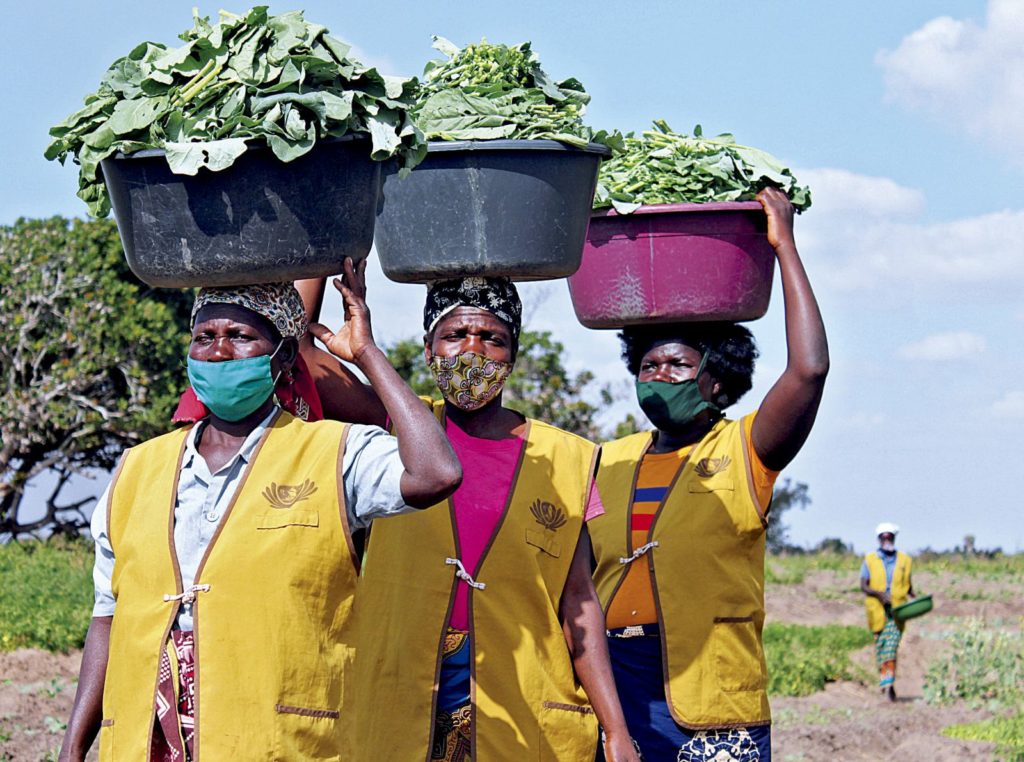
Great Love Farm volunteers in Metuchira. The success of Great Love Farms depends on the work of many volunteers. (Photo by Karmen Long)
A Large Team of Farm Volunteers
Among Tzu Chi's work in the Nhamatanda District, the establishment of farms is especially noteworthy. Denise Tsai (蔡岱霖), originally from Taiwan and the first Tzu Chi volunteer in Mozambique, explained that the idea of cultivating crops to help feed local needy people came from Dharma Master Cheng Yen: "The Master said that where there are people and land, crops can be grown as food." Tsai said that the Master encouraged her to use available land to grow food to aid the vulnerable in Mozambique and to share the spirit of kindness and compassion with local people. "With good people and good land, good results will be achieved," the Master had told her.
Following the Master's advice, Tsai and her husband, Dino Foi, a Mozambican, started leading native volunteers in 2014 to grow vegetables and fruit on a piece of land at the Tzu Chi Home in Mahotas, Maputo, Mozambique's capital. Tsai also began holding gatherings under trees at the Tzu Chi Home to share the guiding principles of Tzu Chi and the teachings of the Buddha and the Master.
After Cyclone Idai in 2019, volunteers from Maputo introduced the idea of growing food to help the needy to people in Metuchira. Tzu Chi obtained two hectares of land in Metuchira to use as farmland and called on local villagers to join in the charitable farming project. Over a thousand people signed up and began volunteering on the farm.
Their work has paid noticeable dividends, especially during the COVID-19 pandemic. President Filipe Nyusi of Mozambique declared a national state of emergency in response to the pandemic, effective from April 1, 2020. Related precautionary measures enacted by the government caused many people to lose their jobs and forced them to leave the cities where they worked to return to their hometowns. The vegetables grown on the Tzu Chi farm in Metuchira helped prevent many people returning to their hometown of Metuchira from going hungry.
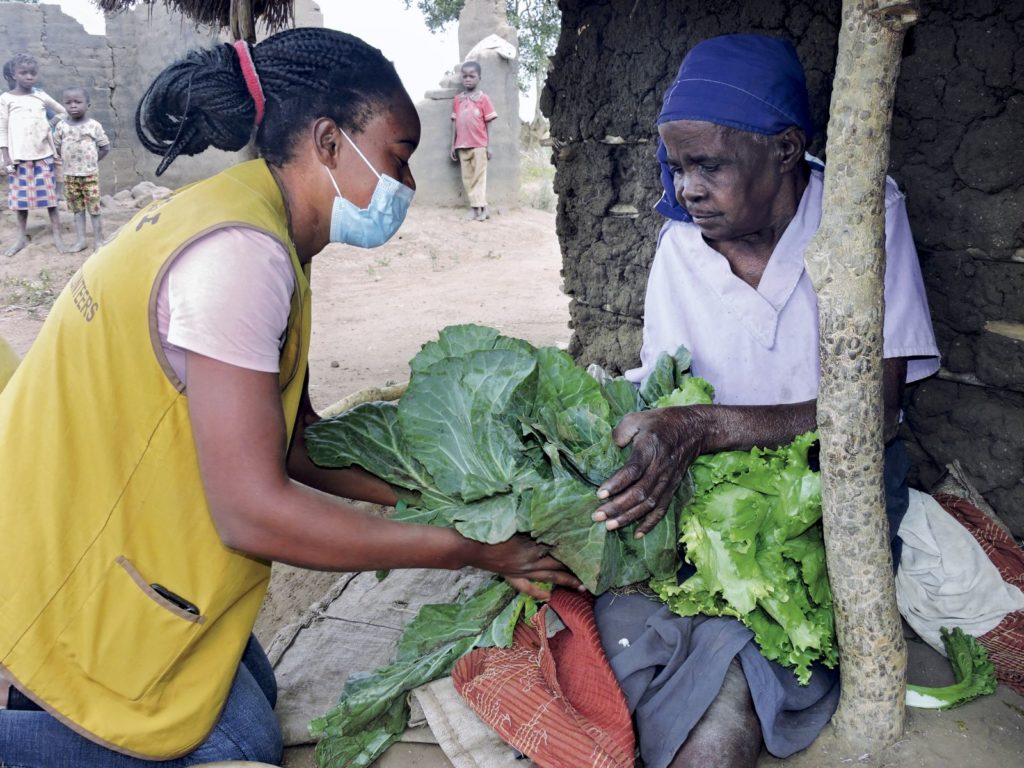
All volunteers on the Great Love Farms in Metuchira are from the area. They know which local household consists of an elderly woman supporting several grandchildren alone and where lives a single mother working hard to fend for her children. After picking vegetables from the farms, volunteers deliver them to such underserved families.
Karmen Long (龍嘉文) is a member of the Tzu Chi International Medical Association and once spent an extended period of time in Mozambique. She wrote in an article that because the 1,700 people who volunteered on the Great Love Farm in Metuchira were from the village themselves, they knew best where the needy people in the village lived. "After every harvest, farm volunteers visited families most in need of help and took them tomatoes and other vegetables picked from the farm," Dr. Long recorded. "By the end of October [2020] they had made enough distributions to benefit 3,600 people." The success of the farm greatly encouraged every volunteer.
The importance of developing reliable food sources locally in Mozambique was magnified by the pandemic. The country relies heavily on South Africa for its food needs. When the latter reduced its food exports during its own pandemic lockdown measures, food prices in Mozambique spiked. Such a development highlighted for the volunteers the risk of relying on food imports to sustain themselves.
To enlarge the farm areas that could be cultivated to grow food for the underserved, Tzu Chi volunteers sought out landowners in Sofala Province that would be willing to provide their land for Tzu Chi to use. Such efforts paid off. In addition to the first farm in Metuchira, the foundation now has two more farms in the village. All three farms are now being used. Volunteers have also acquired four more pieces of land, two each in Nhamatanda and Lamego. The combined area of the seven parcels of land comes to 33.5 hectares, the equivalent of 47 soccer fields.
"The landowners who agreed to provide their land to us each has two to four hectares of land," Denise Tsai explained. "It is beyond them to cultivate their land to grow crops because they are too old. They need water to raise crops, but the amount of water they can fetch from a river or well is not even enough to sustain their household needs, such as that for cooking. How is it possible for them to get enough extra water to irrigate their land? That's why they were willing to lend their land for free to Tzu Chi to help their own fellow villagers."
Tsai's explanations revealed that a big issue for farming in Sofala Province is water supply.
In fact, Mozambique receives no less rainfall than Taiwan, which is known for its agriculture. The problem is that the African country has very distinct dry and rainy seasons. When the weather is dry, it's dry for an extended period. During such times, farmers can only fetch water from wells or rivers to use. Ordinarily, that solution is not tenable on a large scale. But, Tsai said, "We have more than 2,000 volunteers to fetch water from wells or rivers for our farms. Ours is a tremendous team effort."
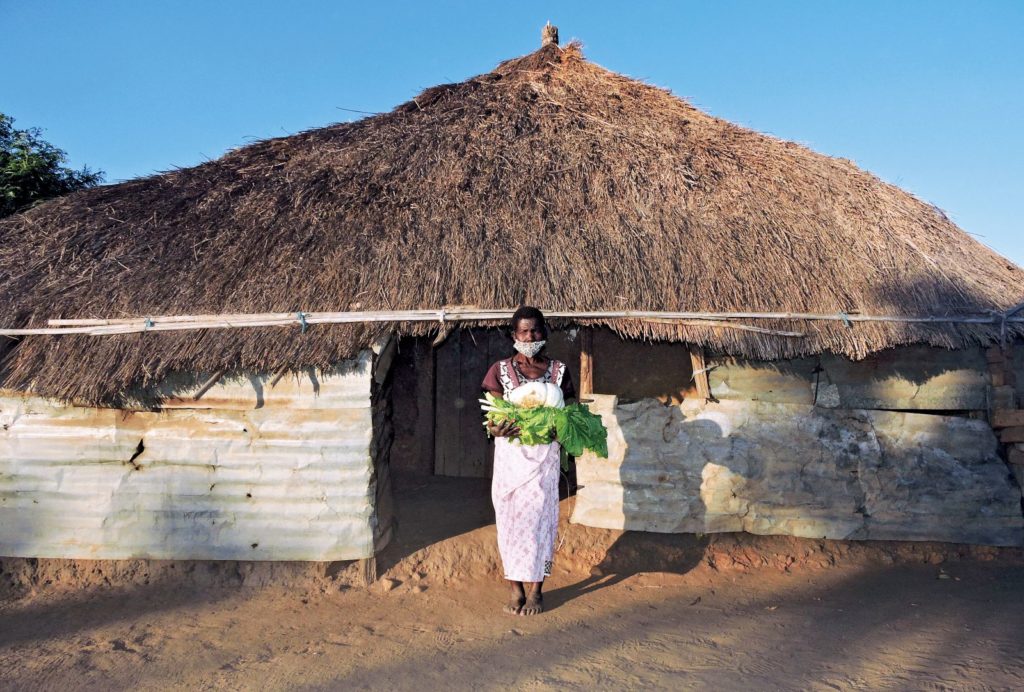
A large variety of vegetables are grown on the Great Love Farms. While cabbages and lettuce might be harvested one month, beans, corn, cucumbers, and tomatoes might be harvested the next. Recipients often get a pleasant surprise when they receive vegetables from Tzu Chi.
Yes, We Can!
With the loving irrigation of so many people, land that might have gone to waste has been transformed into bountiful farms. Volunteers put in a lot of thought when it came to deciding what crops to plant. The local staple, corn, is one of the crops volunteers grow. "Corn flour can keep a lot of people fed," Denise Tsai said. "Volunteers always sing and dance to express their gratitude when they are having the sun-dried corn ground for flour."
But besides keeping people fed, nutrition is important. For that reason, vegetables such as pumpkins, tomatoes, and sweet potato leaves are also grown. They contain a rich array of vitamins. Peanuts are raised for the oil and protein they provide. Because they are such an excellent source of plant-based protein, peanuts also help support a vegetarian diet, which Master Cheng Yen has long been promoting.
As might be expected, good management of the farms is essential to maximizing yields. Tsai and Dino, her husband, selected young people from among Tzu Chi staffers and volunteers to study English and management and receive training in computer applications and other skills needed to manage the farms. These young people did not disappoint the couple; they do a good job managing the farms. They tabulate the crop varieties of each farm, the amounts of seeds used, the dates the seeds are planted, their germinating rates, the estimated harvest dates, the projected crop yields, and more. They also schedule time for weeding and watering and organize farm volunteers into shifts, limiting the number of people for each shift to adhere to the government's COVID safety protocols.
"Their tabular forms even include such information as what vegetables are delivered on which date to which neighborhood," Tsai observed. "Though they still have room to improve, I've been greatly impressed by how mindfully they have recorded everything and managed the farms."
While the young people using modern skills to run the farms have been a comfort to Tsai, a group of 18 volunteers from Maputo have earned themselves even greater admiration from Tsai. These volunteers have been taking turns going to Sofala Province and staying there for extended periods to help Tzu Chi carry out relief and reconstruction work after Cyclone Idai.
Tsai said that those 18 native volunteers are just ordinary people in the lower strata of society, and that like many other people in Mozambican society, they make a living doing odd jobs or farming. And yet, when it comes to serving and helping others, they demonstrate an eager willingness that is truly impressive. All had undergone training and received their volunteer certification. And Tsai still vividly remembers how they all bravely raised their hands in a meeting when a question was put to everyone present whether they were willing to go to Sofala to stay for long periods of time to help implement Tzu Chi work-relief programs there and help victims of Cyclone Idai. "Yes, we can!" they said with enthusiasm.
Many native Tzu Chi volunteers in Mozambique, most of them poor, have demonstrated with their action the truth of Master Cheng Yen's saying: "With resolution comes strength." Though most of them can't read a single Chinese character, they absorb the Master's translated teachings. Most importantly, they live out the Master's teachings by putting their love into action and inspiring more people to join them to help their neighbors and fellow country people.
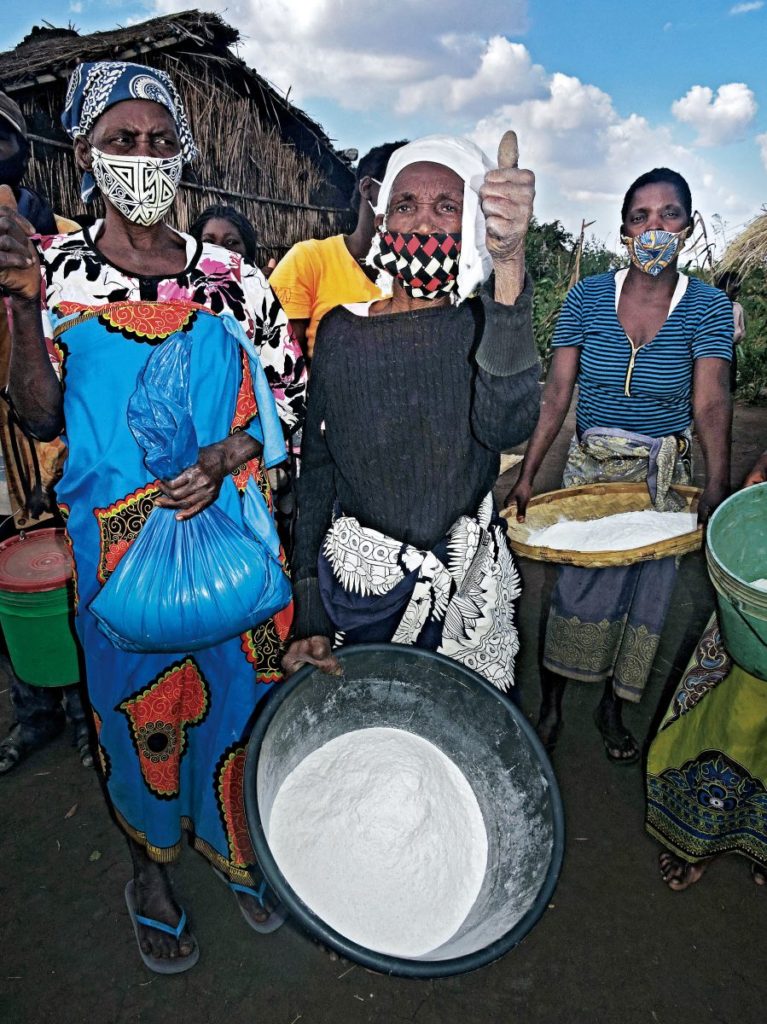
Aid recipients donate some of the corn flour they received from Tzu Chi back to the foundation to help other needy people.
Philanthropic Farming
Talking about the farms Tzu Chi has established, Tsai stressed the importance of helping local people recognize the significance of building their own food system, of making use of the land they have to build resilience into their own communities and help tackle the problem of food insecurity. At the same time, she stressed the importance of sharing positive values and principles in local communities.
Using the Great Love Farms as an example, she explained that if volunteers hadn't shared with local villagers such positive values as mutual help, the villagers might have picked vegetables from the farms and taken them home for themselves instead of leaving them for the needy. They might even have fought with each other to get bigger shares from the farms. If that had happened, Tzu Chi would not have been able to keep the farms going.
"We share with them that our lives will be a lot better if we can help each other," Tsai said, "and that if we help others today, others will do the same for us when we need a hand."
The villagers have taken such values to heart, understanding that they can help others despite being poor themselves. As a result, they cheerfully work on the farms, volunteering there a few days a month. They weed, fetch water to irrigate the vegetables, and do other work. Taking a few days a month to volunteer doesn't affect their livelihoods in any way, but the impact of their combined efforts is significant. Of the seven Great Love Farms, the three in Metuchira have been producing enough crops to be continually given away to help the needy. Over the past year, volunteers have made enough distributions to benefit more than 10,000 families.
There remains much for Tzu Chi to do in Mozambique, and the foundation is picking up the pace with which it is moving forward. Ground was broken in mid-August for a housing project postponed due to the COVID-19 pandemic for survivors of Cyclone Idai. As part of that project, a housing village in Kura, Nhamatanda District, is scheduled to be completed in March 2022. Tzu Chi Mozambique has sent three young people to Taiwan to take courses at Tzu Chi University and train at Tzu Chi headquarters. Two of the young people, having completed their courses and training, are returning to Mozambique in September. Once home, they will put their training and bilingual abilities in Portuguese and Chinese to good use by serving as a bridge between Tzu Chi headquarters and the Mozambique chapter and facilitating Tzu Chi work in the African country.
As for the development of Tzu Chi's farming project, Tsai pointed out that they will ask agricultural specialists to provide guidance in farming techniques and management, and that they might even establish fruit and vegetable wholesale markets in the future to help local farmers sell their produce. She said she has also been thinking about how to deal with the problem posed by the lack of irrigation facilities in Sofala Province. "Maybe we can learn from Tzu Chi Zimbabwe and drill wells for local communities?" she asked.
Though volunteers in Mozambique still have a long way to go, they have taken important and impressive first steps. Native volunteers have shown how, instead of relying on others for help, they can help themselves and reach out to help others too. Just as this saying goes: "Alone we go fast, together we go far." Everything is possible when everyone works together. Let's give the volunteers in Mozambique our best wishes as they work together to transform local lives and create lasting change.
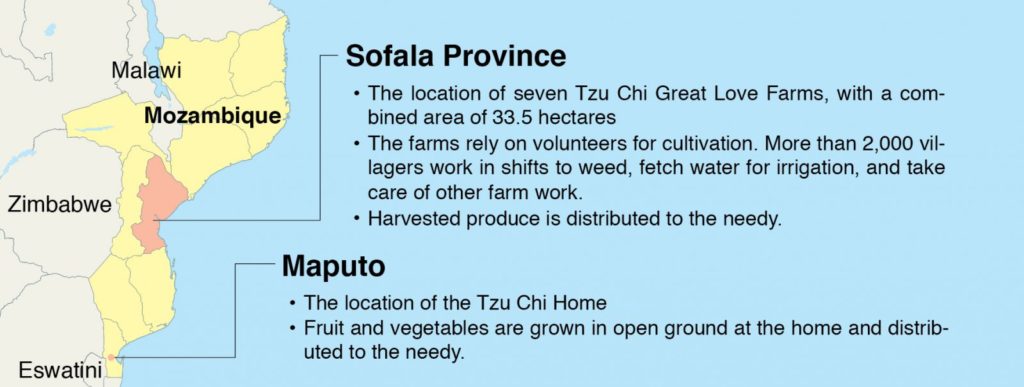
Contact Us | Plan a Visit | Donate
8 Lide Road, Beitou 11259, Taipei, Taiwan
886-2-2898-9999
005741@daaitv.com
©Tzu Chi Culture and Communication Foundation
All rights reserved.
